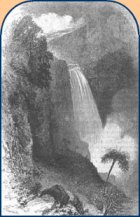Had "Arabi"
only read
Longfellow, he'd
have never been
caught -
Khedive.
"Shall fold their
Tents like the
Arabs, and as
silently steal
away" |
 |
 |
 |
NOTES
Emily wrote this letter, scholars believe, in September 1882,
a year of many personal worries and international events. Charles
Wadworth died, and she wrote to Higginson, "My closest earthly
friend died in April." Two other close friends--Judge Lord and
Higginson--were seriously ill, though these men recovered. Emily's
mother died in November. For events in Egypt, see annotations
below.
Arabi: A reference to the nationalist Egyption leader,
Colonel Ahmad Urabi who resisted European intervention after Ismail
(Khedive) was deposed by the Ottoman sultan who had given him
the title khedive (Arabit for king). Britain burned and occupied
Alexandria in July 1882, and in August invaded the Suez Canal
Zone. Here, Urabi was captured. He was tried, sentenced to death,
but then banished to Ceylon. The British army remained and its
influence continued until 1956.
Longfellow: A widely popular poet and significant figure
in the literary world of Cambridge, Massachusetts. Dickinson wrote
to Susan of Longfellow thirty years earlier when she discovered
a volume of his poetry in the local bookstore: "Longfellow's 'golden
Legend' has come to town and may be seen in state on Mr.
Adams' bookshelves. It always makes me think of "Pegasus in the
pound' . . . " Longfellow died March 24, 1882 in Cambridge, and
his death occasioned many eloquent obituaries in the magazines
of the day by his literary friends. In this later letter/poem,
she refers to Longfellow's "The Day is Done," quoting his last
lines as her last lines. The first two lines of Lonfellow's final
stanza read: "And the night shall be filled with music,/ And the
cares, that infest the day,/ Shall fold . . . "
Khedive: The title given to the viceroy (Ismail Pasha)
of Egypt in 1867 by the Turkish government. "1867 Times
24 May: At a council of the Turkish Cabinet, held on the 14th
inst., the title to be granted to the Pasha of Egypt was at length
definitely settled. His Highness is to be called Khedive, which
is regarded as the Arabic equivalent of King" ( Oxford English
Dictionary 1989, on-line edition).
This is letter #768 in Johnson, Letters. It is presented
here as transcribed by Martha Nell Smith and Ellen Hart in Open
Me Carefully. To view the manuscript image, follow this link
to the Dickinson
Electronic Archive (password protected). |




